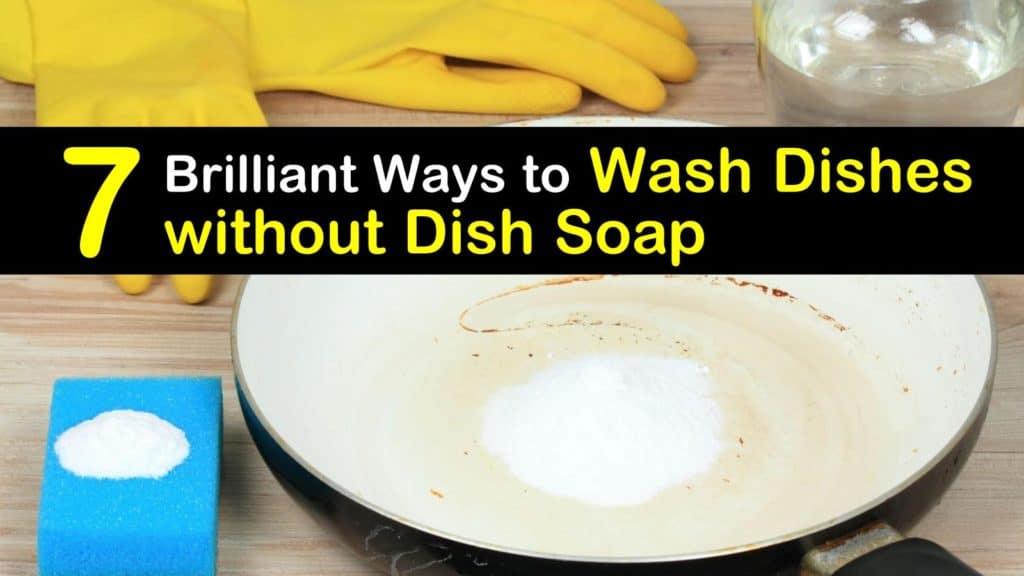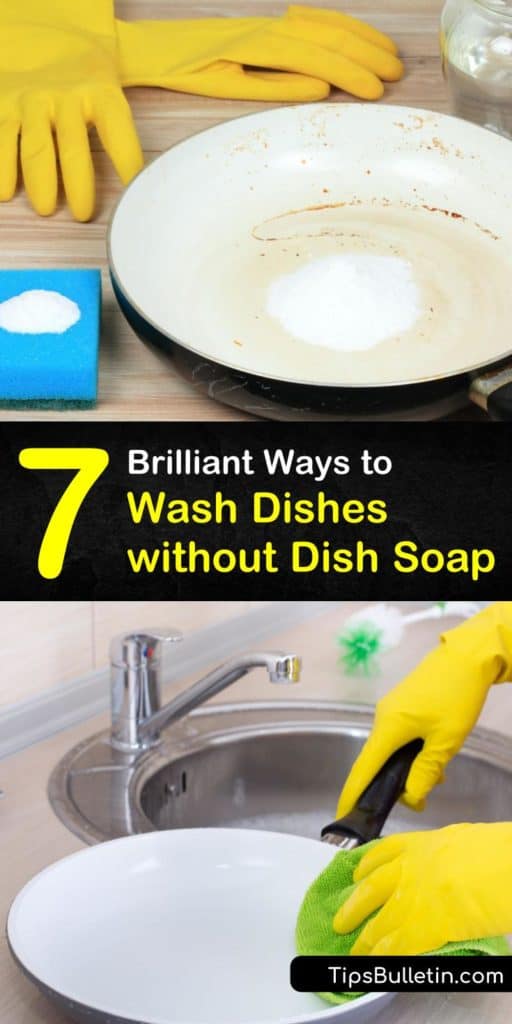How to Wash Dishes in Dishwasher Without Detergent
Have you ever considered learning how to wash dishes without dish soap? Sometimes you find yourself in a pinch, where dirty dishware piles up by the sink, but you ran out of soap. How do you clean the dishes? Do you soak dishes until you make it to the grocery store? What if you're camping and leaving food out isn't an option?
There are a few useful possibilities whether you're camping in the middle of nowhere or staying home to avoid crowded stores in a pandemic world. Popular alternatives to soap include white vinegar, bleach, salt, and baking soda. But, there are so many other choices.
We'll explain the best ways to wash dishes without dish soap. Many of these ideas may have never crossed your mind. Use them when you run out of soap, or stop buying Dawn and other store-bought cleaning products to cut more toxins from your household altogether.

- Brilliant Ways to Wash Dishes without Dish Soap
- Hand Washing Dishes with Hot Water
- Clean Dishes with Baking Soda
- Making Homemade Dish Detergent (Liquid or Powder)
- Using Salt to Wash Pots and Pans
- Try Wood Ash Instead of Dishwashing Soap
- Sanitizing Dishes On-the-Go with Bleach
- Using White Vinegar for a Continuous Clean
- Learn How to Wash Dishes without Dish Soap Safely
- Why Doesn't Everyone Start Washing Dishes without Soap?
Brilliant Ways to Wash Dishes without Dish Soap
Who says you need traditional dish soap? People found ingenious ways to wash dishes without soap for decades before supermarkets made life more comfortable. Our list includes a few brilliant ways that washing dishes without soap is made simple.
The same principles apply when cleaning your clothes, too. You can wash clothes without detergent and get them just as clean (or cleaner) without harsh chemicals.
Hand Washing Dishes with Hot Water
The easiest way to wash dishes without dish soap or running water is to boil water. Boiling water eliminates dust, bacteria, grime, and odor. Make sure to use rubber gloves and avoid splashing dishwater on yourself when washing dishes in super hot water.
Allow hot water to fill the sink and soak dishes with the heat for at least 30 minutes. Use a sponge to scrub the dishes clean. Cleaning up meals with dairy may begin to smell bad during the soaking process, but the smell goes away when rinsing in hot water.
Clean Dishes with Baking Soda
Baking soda is an excellent tool in the kitchen. It cleans and deodorizes just as well as it produces delicious baked goods.
Start with wet dishes. Sprinkle a small pinch of baking soda directly onto the dirty dishes to create a paste, and rub them with a sponge.
You might play with the amount of baking soda, depending on how dirty your plates appear. Scrub until all traces of food particles are gone.
However, baking soda isn't antibacterial. Make sure to sterilize dishes you used with raw meat by dunking them in boiling water for five to ten minutes before drying.
Making Homemade Dish Detergent (Liquid or Powder)
To make homemade dishwashing liquid or powder for the dishwasher, try a DIY baking soda dishwasher detergent for liquid dish soap or a powder made from washing soda, Borax, and citric acid for hard water stains. Making homemade soap is much cheaper, works better, and is 100% natural.
tb1234
DIY Dishwashing Powder
- ½ cup of citric acid (double the amount for hard water)
- ½ cup of salt (kosher or table salt)
- 1 cup of Borax
- 1 cup of washing soda
tb1234
Look for the citric acid in the canning aisle at your local grocery store, combining the ingredients in a mixing bowl. Store the solution in a plastic container, adding only a tablespoon of the dish detergent powder to your machine per load. More produces too many suds.
Using Salt to Wash Pots and Pans
Salt is a powerful dishware cleaner, perfect for scrubbing food residue stuck-on your pots and pans. It's ideal if your plates don't get clean from hand washing, and it even cleans burn residue from cookware.
tb1234
DIY Dishwashing Scrub
- 2 tablespoons of salt (kosher or table salt)
- 1 cup of hot water
- Sponge
tb1234
Combine the salt and water in a mixing bowl, and add it to your cookware. Pour all but a half-inch of hot saltwater from the pan and use the sponge to free food particles from your dishware. Add more salt as needed. Wipe away the mess and rinse.
For some added cleaning strength, you can add a little lemon juice to the scrub. Clean a dishwasher with lemon juice, too. It eliminates odors and mold that may have accumulated in the drum.
Try Wood Ash Instead of Dishwashing Soap
If there's a fireplace or campfire pit available, try using the wood ash when hand washing dishes instead of using dishwashing soap. Wood ash is one of the oldest natural cleaners known to man.
It removes food odors, cleans dishware, and even eliminates hard water or burning signs on metal utensils and cookware. Make more wood ash by burning a slab of wood in advance, then sprinkle the ash directly onto your wet, dirty dishes.
Scrub until you no longer see food residue or stains. Don't touch the ash with your hands. Use gloves and a scrubber with a handle. Rinse thoroughly.
Sanitizing Dishes On-the-Go with Bleach
Chlorine bleach from the grocery store cleans bacteria from dishes well. This recipe is perfect when you're camping or on-the-go.
However, always dilute bleach with warm or cold water for safety. Bleach and hot water don't combine well. Make sure to wear gloves and keep paper towels on hand for spills.
tb1234
Bleach Dishware Recipe
- 1 gallon of cold water
- 1 tablespoon of chlorine bleach
- Large pot or bucket
- Rubber gloves
tb1234
Mix the bleach with cold water in a large pot or bucket. Soak your dishes in the solution for no less than a minute, then scrub and rinse them using hot water. Air dry the dishes on a dish rack.
Using White Vinegar for a Continuous Clean
You may wonder, "What is white vinegar good for?" Vinegar is a popular natural cleaner that many people use to kill bacteria instead of toxic chemicals to clean nearly every surface in the home.
tb1234
DIY Vinegar Liquid Dish Soap
- 2 tablespoons of distilled white vinegar
- 1 cup of warm water
- Spray bottle
- Sponge
tb1234
Combine the vinegar with clean water in a spray bottle, shaking well. Spray the mixture directly onto dirty dishes when you're ready to clean and scrub the plates with a sponge as usual. Rinse thoroughly.
Vinegar also helps keep dishware continuously clean. Add a tablespoon of white vinegar with your regular dishwashing detergent in the machine or to soapy water when handwashing to remove spots.
Learn How to Wash Dishes without Dish Soap Safely
Washing dishes without soap is simple, but first, the sink must be clean. If you don't even have hand soap, start by removing dirty dishes from the sink and cleaning it with boiling water.
Sort the dishes, setting cutlery in a dishpan or basin to soak alone. Wash the rest of the cookware in the sink one at a time. For safety, wear rubber gloves. Even some natural cleaners harm the skin with close contact.
Why Doesn't Everyone Start Washing Dishes without Soap?
Unlike other options, dish soap is a surfactant, which means it removes bacteria and food particles from cookware, repelling them long after use. For the best results, use soap when possible.
Washing dishes without soap is simple when you're in a pinch, like when you run out of soap on a busy weeknight or during a campout. You have many options. Use them depending on your needs, like white vinegar for hard water stains or salt for burnt pots.

If you enjoyed learning how to wash dishes without dish soap, please share our tips for washing dishes without soap on Facebook and Pinterest. Our ideas may help your friends and family, too.
How to Wash Dishes in Dishwasher Without Detergent
Source: https://www.tipsbulletin.com/how-to-wash-dishes-without-dish-soap/